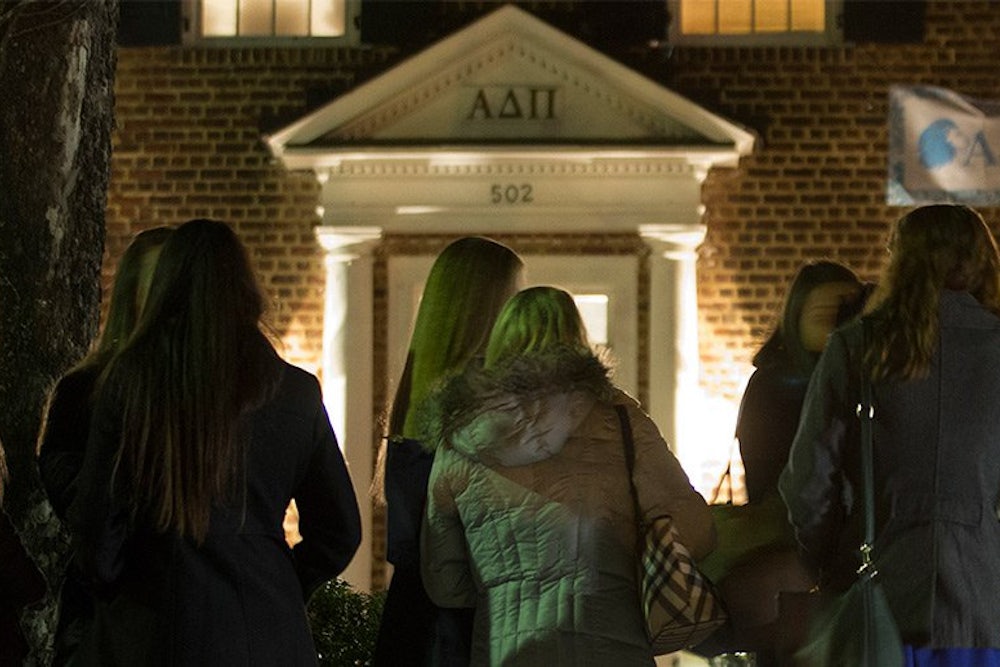Saturday at the University of Virginia was men’s bid night, one of the campus' biggest social events. This year half its usual attendees were missing in action: Sorority members at UVA have been forbidden to attend the frat parties. The order comes from the sororities' national presidents, who cited safety concerns and instructed women to organize “sisterhood events” instead. Women who defy the prohibition risk suspension, fines, and other penalties, national offices warned.
The decision was announced just days after university president Teresa Sullivan lifted the school's suspension of Greek social activities. Unsurprisingly, it has prompted a backlash. UVA sororities contend the ban on parties is sexist: It places the onus on women to avoid sexual assault instead of on men to control their behavior. Rather than compelling fraternities to change, it sends the message that women need to change—mainly, they need to stay away—to accommodate male dispositions. More than 2,400 people have signed an online petition condemning the national sororities: "Why don't we start teaching boys not to rape instead of teaching girls how to protect themselves against rape? Given recent condemnations of fraternity culture, it's ironic that a feminist protest might now mean defiantly attending a frat party.
The proper response to male misbehavior should not be to limit women’s freedom or restrict their agency. As some protesters argue, the ban implicitly endorses a blame-the-victim mentality. It seems to be rooted in the same thinking that reproaches a rape victim for wearing suggestive clothing or for “asking for it” by drinking in the wrong company.
Boycotts in themselves can compel reform. The problem is that sorority sisters aren’t shunning frat parties of their own accord; they’ve been ordered to stay away by maternal overseers, which is infantilizing. The ban doesn’t protect women so much as it disempowers them. It takes away their ability to choose and organize their own response to assault. College administrators and other officials are addressing sexual violence, and campuses need a strong approach to confronting such assaults. But protecting women by forcefully curbing their options and behavior is plainly misguided.
Lasting change requires that college women take back power on their own. This struggle is about their schools, their lives, their bodies. And fraternities aren’t going to take demands for change seriously if they’re dictated by parental supervisors. If female students want to be treated differently, they have to fight for it. No one else can do it for them.
Here’s a thought experiment. Imagine that sororities across the country collectively refused to attend fraternity parties. What if they chose to boycott, to stand in solidarity with the latest rape victims? That would send a powerful message. It might force fraternities to think seriously about the culture they perpetuate and the consequences of their behavior. It would show women taking ownership of their campuses and their lives.
A meaningful boycott requires consensus and agency, both well within reach of college-aged adults. Why aren’t students coming up with something like this themselves? Why do the grown-ups have to come in and make the rules? Some sorority members, to their credit, are trying to lead the way: at Dartmouth, five high-level members of the school’s Panhellenic Council sent out an email explaining their decision to boycott this season’s sorority rush. They cited “clear flaws” in the Greek community—sexual assault, binge drinking, and a superficial recruitment process that favors girls who approximate “a narrow sorority ideal.” They called for sororities to “stop blindly empowering fraternities in cases when they fail to create safe spaces for all sorority members.” These women recognize, rightly, that the Greek system in America needs “a complete overhaul." Their email reads: “This is a call for moral leadership and for us as a community to look inward at the system we perpetuate through our participation, whether consciously or passively.”
Their call for change seems to have fallen mostly on deaf ears. Instead of initiating a serious re-evaluation of Greek life, Panhellenic executives and sorority presidents voted to go ahead with rush as planned. Perhaps girls are reluctant to lose out on the fun of parties. Perhaps they’re wary of seeming too militant. But the goal here isn’t to be likeable; it’s to be respected, something far more lasting and hard-won. And if girls are more concerned with being liked than with preventing assault, nothing will change.
Sororities' notion of sisterhood seems impoverished. The imposed boycott demonstrates how derelict most sorority leaders have been in devising solutions. What should the role of sororities be in this struggle? They are social organizations, structured around making friends, going to parties and, occasionally, performing service projects. Perhaps it is time that they also become agents for social change on their own campuses. The petition to revoke the ban on attending frat parties indicates UVA’s sororities are capable of mobilizing themselves. What else can they accomplish? What are sororities going to be to their members and their communities? For all the talk about new administrative rules and regulations, it's hard to believe fraternities will change much unless sororities compel them.
